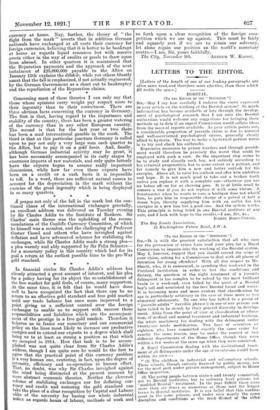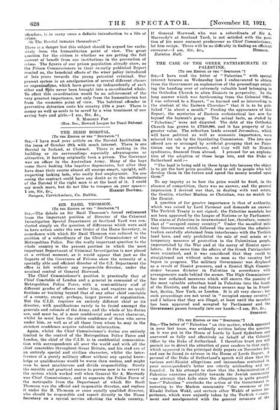[To THE EDITOR OF THE " SPECTATOR.") SIR,—It is with
the greatest satisfaction that all who care for the prevention of crime have read your plea for a Royal Commission to inquire into the working of the Borstal system. May I, however, suggest that you should extend the scope of your claim, asking for a Commission to deal with ail places of detention for young offenders? With all due respect to Mr. Shortt, who,. it is announced, is.spending this week-end in the Portland institution in order to test the conditions and dietary, the question of the right treatment of a juvenile delinquent is too complex to be solved by the most brilliant brain in a week-end, even lulled by the quiet of a Borstal boy's cell and nourished by the best Borstal bread and water. It is becoming more and more evident that classification by age is particularly arbitrary in the case of these more or less abnormal adolescents. No one who has talked to a group of "juvenile adults" (terrible phrase!) in one of our prisons can have failed to be struck by their general diversity in develop+ meat. Alike from the point of view of classification or educa- tion, of medical and mental treatment and industrial training, the whole machinery for dealing with the delinquent under twenty-one needs modification. Two boys of seventeen or eighteen, who have committed exactly the same crime for exactly the same reason, may be under the control of two different departments of the Home Office, though they were within a few weeks of the same age when they were convicted.
A Royal Commission dealing with the institutional treat- ment of all delinquents under the age of twenty-one would have within its view:- " (1) The children in industrial and reformatory Schools. These schools, though entirely financed by public money, are for the most part under private management, subject to Home Office inspection.
(2) The young people between sixteen and twenty committed, not to Borstal institutes, but to ordinary local prisons for modified Borstal' treatment. In the year 1920-21 these were more than six times as numerous as those sent for longer terms to Borstal institutes. It is our belief that this confine- ment in the same prisons, and under very nearly the same discipline and' conditions as the most dismal' of the older
offenders, is in many cases a definite introduction to a life of crime.
(3) The Borstal inmates themselves."
There is a danger lest this subject should be argued too exclu- sively from the humanitarian point of view. The great question for the citizen- is whether we are getting the full amount of benefit from our institutions in the prevention of crime. The figures of our prison population already show, as the Prison Commissioners in their recently published Report remind us, the beneficial effects of the wiser policy introduced of late years towards the young potential criminal. Our present system is an amalgamation of several different classes or organize:gen:is, which have grown up independently of each other and llyote never been brought into a co-ordinated whole. To effect this co-ordination would be an achievement of the very greatest importance, not only from the humanitarian but from the economic point of view. The habitual offender in preventive detention costs his country £934 a year. There is money es well ina souls to be saved by a wise treatment of our erring boys and girls.—I am, Sir, &c.,
S. MARGERY FRY
(Hon. Sec., Howard League for Penal Reform).







































 Previous page
Previous page